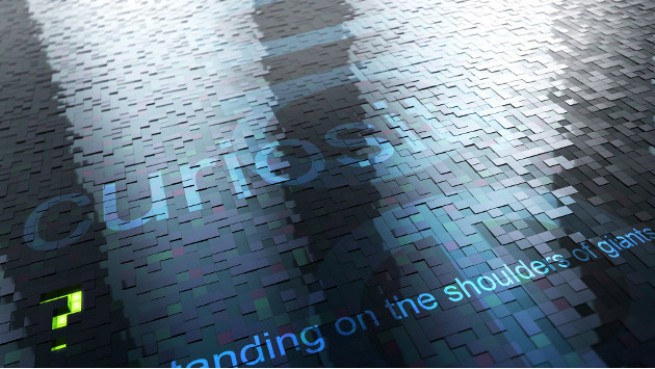I just spent the last 10 minutes chipping pixels away from a giant video game cube.
That is the central gameplay of noted video game maker Peter Molyneux’s first effort with developer 22Cans, Curiosity. It’s terribly boring, so why did I do it? Well, because I’m curious — and that curiosity may prove to be the first time that Molyneux has delivered on his wide-sweeping promises of emotional and affecting game development.
Molyneux’s game is an experiment that tests the boundaries of human curiosity. You see, everyone is chipping away at the same cube. It’s hiding a secret beneath its many layers, and collectively, we’ll reveal whatever it is. But here’s the kicker: Only one player will get to see the secret.
Curiosity is a free-to-play game available now on Android and iOS. It’s gameplay is no deeper than what I already described, but it does have an in-app store where players can buy tools to help them chip apart the cube faster.
This strange game poses many questions. First, will anyone actually suffer through the boring mechanics for a minuscule chance of finding out the secret?
When I started up my game, it told me that I am something like the game’s 48,000th player, which means I have at least a 1 in 48,000 chance of discovering the secret at this point. That’s without knowing how long it will take to open the cube. I doubt I’ll stick with it long enough to have any chance at all.
Second, will people pay money to improve their chances to learn a secret that could prove to be very anticlimactic?
As players chip away at the pixels, the game awards coins. You can use those coins in the game’s shop to buy tools like the Iron Chisel. This item destroys nine “cublets” at a time for 5 minutes. Every item has a time limit. This tool costs 300,000 coins. I have 340. According to 22Cans plans for downloadable content, 300,000 Curiosity coins costs about $8 if you’d rather pay than mindlessly tap for coins.
But that’s nothing. The Diamond Chisel costs 3 billion coins, or $80,000.
Third, what will the winner do with the secret?
In the official contest rules, the 22Cans notes that the secret is some kind of video. The “winner” can share it however he chooses, or he can keep it for himself. Some have speculated that the winner could auction off the video to the highest bidder, but 22Cans forbids them from using the secret for monetary gain.
http://youtu.be/b72HoQSQmEk
Beyond the obvious questions, Curiosity is yet another game that reveals the dark nature of humans.
Since each cubelet is essentially a pixel in the larger cube, people have begun to draw images and write words that everyone who is playing the game can see. Naturally, these words are universally terrible. Someone emblazoned one of the cube’s sides with a vile racial slur. It’s the first thing I saw when I booted up the game. It’s kind of scary how quickly everything humans do devolves into something mean and stupid. And yet, the word is no longer legible as other players work to erase it.
And perhaps that is the larger point of this experiment:
22Cans provided a canvas or a playing field to a bunch of humans. Terrible people use it to do something that upset decent people. That inspires those decent people to take action and undo what the awful people did. But the truth is that both groups are working toward the same ultimate goal. They are two sides of the same coin and they motivate one another into a perpetual cycle that powers this entire game.
It’s a microcosm of humanity’s faux-duality. We think we’re all so different from one another. Democrats think Republicans are holding them back and vice versa. But the hidden truth is that we need our opposites to motivate us. We think we’re working against one another, but the constant back and forth of every human struggle accomplishes the same thing: The advancement of the human species.
Or maybe it’s just a bunch of people goofing off on their phones while they use the bathroom.
Peter Molyneux is a veteran game designer. Recently, he was in charge of the Fable role-playing game series for Microsoft while running his Lionhead Studios. He made his name with the 1989 strategic god-simulator Populous for PC. Molyneux left Lionhead in March to work with a former colleague at 22Cans. He may be best known for making wild, interesting promises about his games without necessarily delivering on them. This character trait is so prominent that it spawned a Twitter parody account called PeterMolydeux who only tweets insane ideas for games, like one about a character who wakes up with amnesia in a museum dedicated to his life.
So while Molyneux has a history of promising something different, this time, he may have delivered.
Right now, Curiosity is just an enigma. It’ll be most interesting when the game is over and we find out all the interesting stats from Molyneux. Did anyone actually buy the $80,000 chisel? How much money did the person who won spend? What the hell is this video all about?
That last question will probably have the least climactic answer, but try telling that to a curious human who just wants to know what is in the cube.
VentureBeat's mission is to be a digital town square for technical decision-makers to gain knowledge about transformative enterprise technology and transact. Learn More

